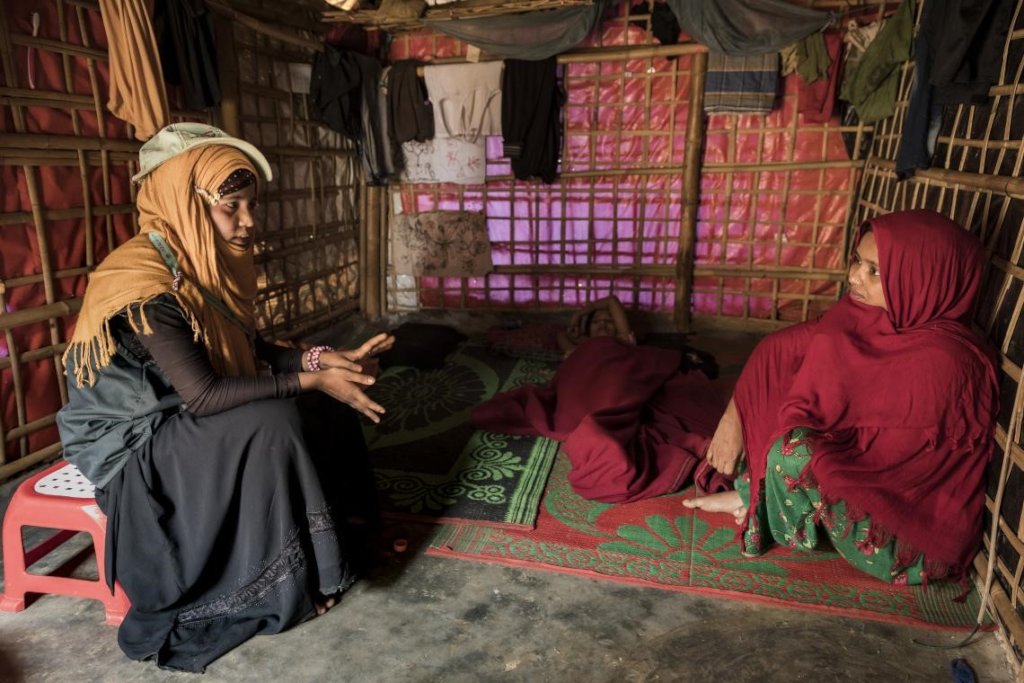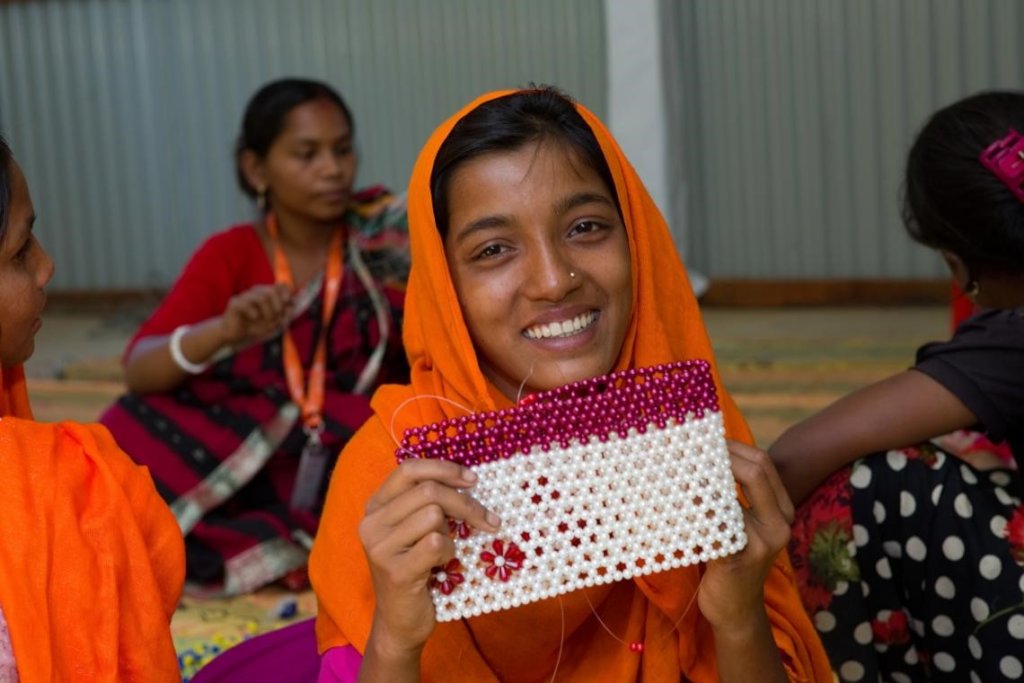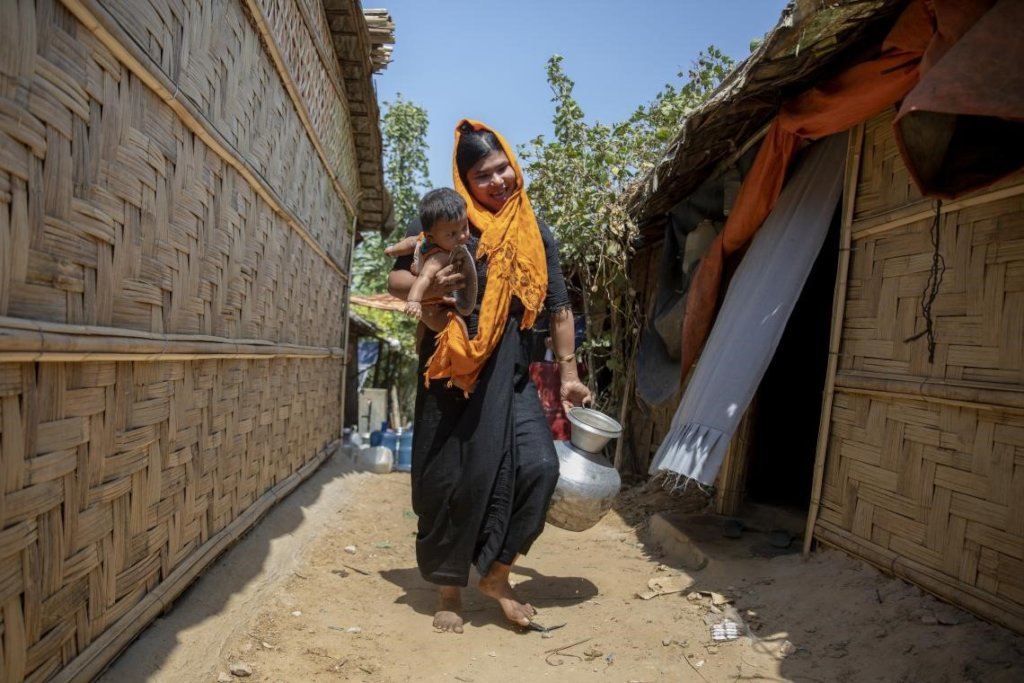By Kelly | Senior Associate, Global Cause Partnerships
Dear Friend,
In 2017, escalating violence triggered an exodus of Rohingya people from Myanmar to Bangladesh. Men, women and children brought with them accounts of the unspeakable atrocities. The survivors, holding onto little more than memories of loved ones lost, fled their homes and crossed the border into Bangladesh. It was an agonizing journey for those who survived. They walked many miles, crossed mountains, rivers and the bay. For some the journey took a few days, for others over one month. Children carried whatever belongings they could grab while fleeing home, but the greatest burdens were pain, fear, exhaustion, starvation and thirst.
In Rohingya camps in Bangladesh, UNICEF and implementing partners are providing health, nutrition, water, sanitation and hygiene (WASH), education, child protection and gender-based violence services at scale. UNICEF works with the government to help connect children with the services, supplies and care they need for a fresh start and a bright future. Since their arrival in Bangladesh, Rohingya refugees grappled with new challenges – floods, landslides, severe storms and now, they are fighting against the COVID-19 pandemic.
From this tragedy, inspiring tales also started to emerge. There are stories of courage, determination and strength to rebuild lives from scratch in challenging and overcrowded refugee camps. Thousands of Rohingya children, youth and women are leading this endeavor, striving for a hopeful, better future. There are now nearly 860,000 Rohingya people living in exile in the world’s largest refugee settlement, located in Cox’s Bazar, Bangladesh. Over half of them are children.
“I miss my home in Burma a lot,” says 14-year old Kohinur who is learning Burmese and English alongside handicrafts at a UNICEF-supported center. “My family owned a two-story farm-house which had some land, livestock and a beautiful balcony.” She had to leave all this behind and rebuild her life in a refugee camp far from home. At the UNICEF center, this is the first time she has received any education and training since her family fled to Bangladesh in 2017. Kohinur says that the center has given her a new purpose in life and is a welcome respite from the daily household chores, which includes cooking rice and collecting water. Prior to the COVID-19 outbreak, she was attending the center six days a week. She hopes that one day she can become a tailor and earn a living.
Asheka was 16 years old when she became a youth volunteer in the Rohingya refugee camp in 2018. She has helped save countless lives in her community by visiting homes and simply sharing lifesaving information on better hygiene management for improved health. “I mainly speak with women and girls in my community to inform them about how to care for children and their own health by following best practices of hygiene management at home.” Asheka arrived in Bangladesh in September 2017 after a grueling journey from Myanmar. In the camps, though it is very tough, she enjoys the challenge of working as a youth volunteer, " I feel very happy that I'm able to do something for my community that I didn't know I could do before coming to UNICEF’s information and feedback center and receiving training on sharing correct messages."
“When I managed to cross the border and reached Bangladesh from Myanmar, all I wanted was to have a drop of clean water,” says Sanjida, a young Rohingya refugee mother of a six-month-old baby girl. “Throughout our journey to reach Bangladesh, we suffered so much, we were running to save our lives, but we did not have access to drinkable water. We were thirsty and falling sick.” Sanjida now lives in a densely populated Rohingya refugee camp in Cox’s Bazar, Bangladesh. “My concerns are always about my daughter. The living conditions in the camp are very harsh but I must ensure that my child is safe and healthy. One thing that makes a big difference to maintaining the health of my child is the safe water taps that are installed near our home. This is lifesaving!”
UNICEF is mobilizing its resources to minimize the impact of COVID-19 on Rohingya people like Kohinur, Sanjida and Asheka. The COVID-19 pandemic has brought a new threat to these overcrowded conditions. Many refugees live in flimsy bamboo and tarpaulin shelters where the dangers of everyday life remain all too real, including the high risk of the spread of infectious diseases like the coronavirus. With your partnership, UNICEF is disseminating lifesaving messages; scaling up handwashing points and hygiene promotion; adopting infection and control measures at all service points; and adopting alternative modalities including home-based caregiver-led learning and one-on-one psychosocial support.
UNICEF will continue to ensure that all Rohingya children are supported with the holistic care needed to return them to a sense of normalcy and ensure that they can thrive.
On behalf of Rohingya children, thank you.
Project reports on GlobalGiving are posted directly to globalgiving.org by Project Leaders as they are completed, generally every 3-4 months. To protect the integrity of these documents, GlobalGiving does not alter them; therefore you may find some language or formatting issues.
If you donate to this project or have donated to this project, you can receive an email when this project posts a report. You can also subscribe for reports without donating.


